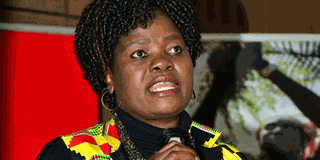Gender data breaks glass ceiling in Kenya Economic Survey

UN Women Kenya Country Director Anna Mutavati. PHOTO | POOL | NATION MEDIA GROUP
The release of the Kenya Economic Survey 2020 this week, has cast a spotlight on the formidable economic challenges that lie ahead for Kenya amidst the Covid-19 outbreak. Yet, one bright spot deserving of deeper coverage is the inclusion, for the first time, of a chapter dedicated to gender equality and women’s empowerment.
This bold and futuristic move by the Kenya National Bureau of Statistics (KNBS) holds significant promise for Kenya’s socio-economic transformation agenda, more so for the women and girls who make up slightly more than half of the country’s population.
Developed through a consultative and collaborative process with sector players, the inaugural gender chapter is a testament to the growing recognition of the overriding importance of women’s empowerment for sustainable economic development in Kenya.
Covid-19 impact
The survey rightly recognises the importance that the 2010 Constitution of Kenya places on gender equality and the participation of women and girls in the country’s developmental agenda. This has provided a platform from which to put in place programmes and policies, legislative and administrative measures designed to materially improve the wellbeing of women and girls in Kenya.
Yet despite these often ground-breaking initiatives, Kenya still lags behind most of its peers in making progress towards closing the gender gap. While it is too early to gauge the full impact of Covid-19 on the Kenyan labour force, it has already cast a spotlight onto how little economic and social value is attached to the essential caregiving, childcare and other undervalued domestic work carried out by women and girls. Their heightened vulnerability during this time – largely as a result of their reproductive, productive and community management roles – makes it clear that women’s empowerment is now more vital than ever.
As the country celebrates Labour Day, it is worth bearing in mind that 70 per cent of low wage- earning women are in the informal economy – the sector hit hardest by movement restrictions and falling consumer demand. Targeted social protection and economic stimulus packages should be implemented fast to mitigate the worst effects.
Domestic violence
Experience from global health crises such the Ebola outbreak shows that the populations most at risk during pandemics include those who depend heavily on the informal economy, are in areas prone to shocks, and have inadequate access to social services. Women and girls also have limited access to political influence and technologies, and limited capacities and opportunities to cope and adapt, putting them squarely into the vulnerable bracket.
Indeed, various sources indicate that domestic violence has tripled in countries practicing social distancing, restriction in movement and resulting loss of livelihood. In Kenya, a concerning surge in incidences has been noted with at least 35 per cent of crimes reported in this season related to gender-based violence (GBV), keeping in mind that many cases of GBV often go unreported. With upwards of 70 per cent of the workforce as low wage earners in the informal sector and horticulture, both of which have been disproportionately hit by the pandemic, women are particularly economically disadvantaged.
Globally, officials and activists are increasingly recognising the power of systematic and comprehensive gender data in identifying and addressing current challenges. Not only can data tell us the size and nature of the social or economic problem that needs to be addressed, but it can also bring clarity on who is falling through the cracks. All too often, in Kenya, women and girls are rendered invisible by the paucity of data on issues that disproportionately affect their lives.
Women count
An Open Data Watch survey in 2018, found that Kenya had the lowest availability of gender data in 15 countries surveyed across sub-Saharan Africa. A national gender statistics assessment conducted by UN Women in Kenya in the same year found that most counties lacked the necessary infrastructure and capacity to collect and manage gender differentiated data.
As part of its global ‘Women Count’ initiative, UN Women and its partners seek to plug material gaps in our knowledge about women and girls in Kenya that make it virtually impossible to track the country’s progress towards achieving Sustainable Development Goal 5 on gender equality and the empowerment of all women and girls by 2030.
Consequently, officials and activists – armed with the mantra ‘You can’t change what you can’t measure’ – have been seeking to bridge the gap by collecting data on a wide range of issues faced by women and girls.
In Kenya, significant foundational blocks have been laid towards closing the gender data gap. These include training a new cadre of government statisticians on collecting gender data and incorporating it into key government policies and planning documents such as the Economic Survey 2020, including considerations for gender-responsive budgetary allocations towards response and recovery plans for Covid-19.
Given the limited data availability, these partners are embarking on a rapid gender assessment that will seek to establish the differentiated impact of Covid-19 on the socio-economic wellbeing of women, men, girls and boys to provide appropriate programme and policy recommendations.
In the spirit of Labour Day – UN Women pays tribute to workers’ sacrifices in achieving economic and social rights all over the world.
Anna Mutavati is UN Women Kenya Country Director




